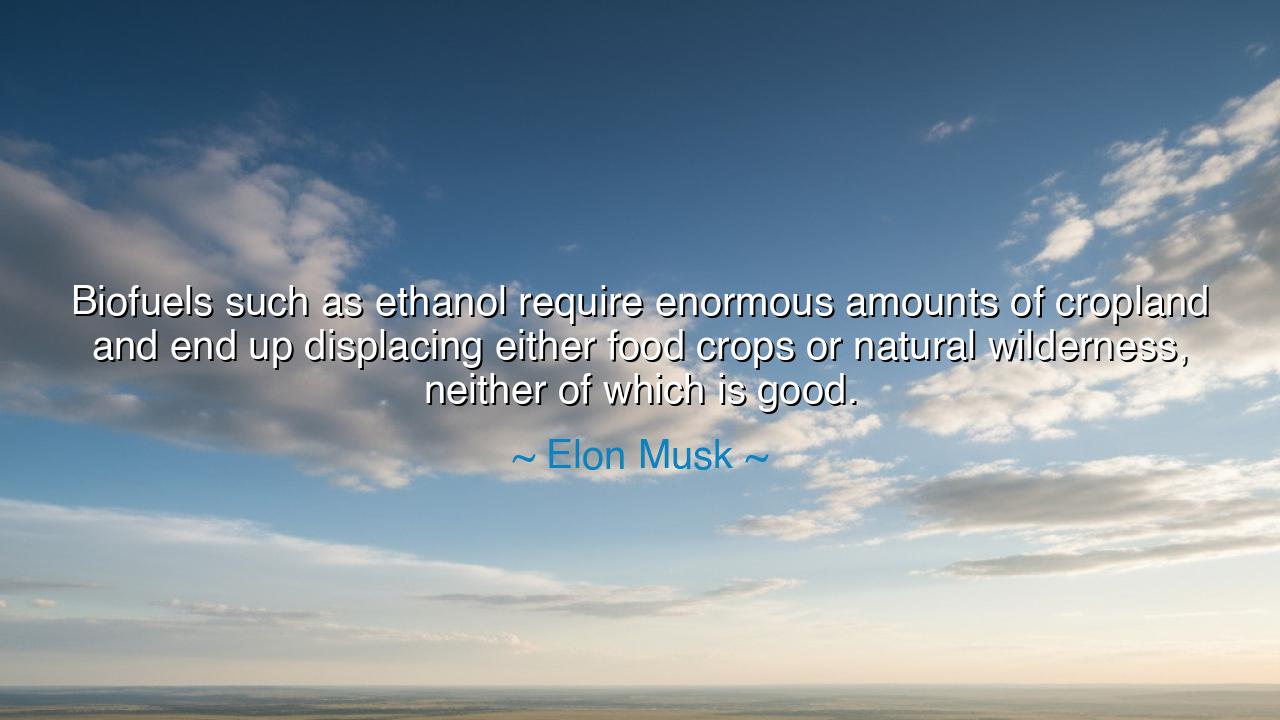
Biofuels such as ethanol require enormous amounts of cropland and
Biofuels such as ethanol require enormous amounts of cropland and end up displacing either food crops or natural wilderness, neither of which is good.






In the councils of elders, where memory is long and speech is weighed, we are taught to ask not only, “What shines?” but, “What does it cost the earth?” So when Elon Musk declares that biofuels such as ethanol demand enormous amounts of cropland and thus displace either food crops or natural wilderness, he names a tension as old as agriculture itself: the peril of feeding one hunger by starving another. Beneath his words lies a simple, sobering arithmetic—land is finite, life is many, and our choices write their ledger upon soil and seed.
The promise of biofuels once glittered like the first fire in a dark cave: power from plants, energy grown anew with each season. Yet the ancients would warn that every gift carries a shadow. To pour fields into tanks is to ask the ground to carry two burdens at once. When cropland bends toward ethanol, the table of the poor may empty, and when the plough cuts deeper to make room, the wilderness withdraws—its waters muddied, its birds homeless, its quiet undone. Thus, what seems a balm may hide a blade, and what seems “green” may, in a longer view, be not good.
Consider, children of tomorrow, a real episode from our own age. In the late 2000s, great nations turned their gaze to ethanol, summoning vast fields of maize to flow not into bread but into fuel. In nearby markets, the price of corn and tortillas rose; in far-off forests, new edges were cut as growers chased demand. Households felt the pinch like winter on thin clothes; ecosystems felt the wound like smoke in the lungs. No tyrant lifted a sword—only policy and profit shifted the furrows—and yet the outcome echoed the old tragedies: when the plough marches without wisdom, the harvest feeds fire before it feeds people.
Another tale speaks from islands crowned with rainforests. Where biofuel demand favored certain oils, the green cathedrals fell tree by tree, and peatlands—ancient vaults of carbon—were opened to the sun. The air dimmed with haze; rivers ran silted and slow; creatures that once stitched the forest canopy vanished like forgotten hymns. Here is the second edge of the displacement Musk names: when food crops do not yield their cropland, the wild places surrender theirs, and the debts are paid in species, water, and sky.
Yet let us not harden our hearts into scorn. The urge behind biofuels is kin to the noble desire to spare our children a choking world. The ancients teach: do not despise the impulse—discipline it. Ask of any path: does it lessen harm across the whole circle of life? Does it spare soil as well as air, the hungry as well as the hurried, the forest as well as the freeway? If not, we must return to first principles: efficiency, sufficiency, and reverence for limits.
From this saying draw a clear lesson: energy worthy of the future must not devour the future’s bread or the future’s forests. Favor that which treads lightly on land—wind, solar, true electrification, wise efficiency—and harness fuels from wastes and residues before you plunder living fields. Honor the hierarchy: first, reduce; then, reuse; then, electrify; and only then, with discernment, substitute. In this order lies harmony; against it lies the slow riot of unintended consequence.
And now, practical steps for walkers on this path. Choose machines that sip rather than gulp; mend what you own; share what you can. Support policies that prize yield per acre without poisoning the acre, and that protect natural wilderness as the treasury of climate, water, and wonder. Favor power drawn from rooftops and windswept ridges over power squeezed from tomorrow’s meal. Ask hard questions whenever a “green” promise asks for more cropland than wisdom can spare. In doing so, you will practice the elder craft: to see the whole, to weigh the hidden costs, and to choose the good that is truly good.






AAdministratorAdministrator
Welcome, honored guests. Please leave a comment, we will respond soon